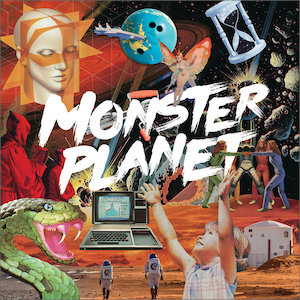::..:::…..:..::….:::::..:::..:::::::……:::…::.:::….::::..:..:::…::…….:::::
A lot of attention has been focused toward the brutal efforts of the Recording Industry Association of America to stop the free file sharing of music, yet the media has done little to educate music listeners about the benefits of free music. You do come across the occasional blurb about how some unsigned rock band gained exposure from free MP3’s and signed a recording contract, but this is Igloo Magazine, so lets localize the topic of discussion to what we really care about – electronic music. At Phlow Magazine’s MP3-labels page, 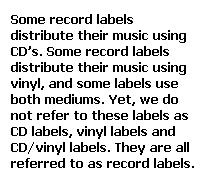 there are over 80 electronic music labels listed. All of these labels offer free downloads of their music via the internet. Media coverage of these labels has been minimal, especially from the American and English printed press. Some printed electronic music magazines have not even reviewed a single piece of music from these 80+ labels. Even more amusing are free, web-based e’zines that operate under the same model used by these labels, yet they are only willing to review CD’s and records. Nevertheless, there is a growing subculture that consists of record labels that use free downloads via the Internet as their primary distribution tool.
there are over 80 electronic music labels listed. All of these labels offer free downloads of their music via the internet. Media coverage of these labels has been minimal, especially from the American and English printed press. Some printed electronic music magazines have not even reviewed a single piece of music from these 80+ labels. Even more amusing are free, web-based e’zines that operate under the same model used by these labels, yet they are only willing to review CD’s and records. Nevertheless, there is a growing subculture that consists of record labels that use free downloads via the Internet as their primary distribution tool.
The term netlabel refers to labels that use the web to distribute their music for free. Netaudio refers to free audio on the web, but not necessarily from netlabels. The terms are useful in the sense that they help music listeners locate free high quality audio on the web. However, it is unfortunate that the medium used to distribute the music is also used to describe the genre of these record labels. If you wanted to purchase a CD of the London Philharmonic Orchestra performing Beethoven’s 9th Symphony, you would look in the Classical bin at the record store. If the London Philharmonic decided to no longer license
this same recording to a record label but instead distribute the recording from their website as a free MP3 download, does that cause the recording to now belong to the netaudio genre? Is it not still a recording of a classical piece of music? Some record labels distribute their music using CD’s. Some record labels distribute their music using vinyl, and some labels use both mediums. Yet, we do not refer to these labels as CD labels, vinyl labels and CD/vinyl labels. They are all
referred to as record labels.
On a similar note, labels that use CDr’s to distribute their music are referred to as CDr labels rather than record labels. Los Angeles based record label Phthalo started by selling albums in the CDr format. Eventually, Phthalo decided to use manufactured CD’s from a pressing plant. Phthalo reissued some of their original CDr’s as pressed CD’s; Suddenly, the same music was accepted by more distributors, retailers and the press thought it was worthy of review. Again, please note, the same music is being referred to here. The music industry pushes a paradigm that official and proper releases only come in the form of pressed CD’s and vinyl. However, with the recent success of Apple’s iTunes, the music industry will redefine the official medium, right before your very eyes. When the majority of music consumers acquire their music digitally through the internet, will all music suddenly be categorized by the netaudio genre?
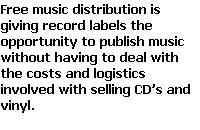
When Warp, Mute and Matador make the move to distributing their music digitally through the
Internet, will we refer to them as netlabels or record labels? Music listeners and members of the press need to be careful about labeling music according to the format used for its distribution. If an artist releases a high quality album for free on the net and it is downloaded by several thousand people, the album will have an equal or greater number of listeners as a successful CD or record from most independent labels. If an online album has as many or more listeners than most of the CD’s and records in the review section of a magazine, the editors of the magazine are not doing the online album justice by placing the review in an isolated MP3 of Month section. These albums deserve the same attention as albums in the vinyl and CD format.
There are several reasons why a label may choose to distribute its music as free downloadable audio. A major reason is because most independent record labels do not profit from their releases. Only a handful of indie labels like Warp and Mute make a profit from their CD’s and records. Free music distribution is giving record labels the opportunity to publish music without having to deal with the costs and logistics involved with selling CD’s and vinyl. Many labels that have switched to distributing music for free via their website are finding they are able to reach a
larger audience. By reaching a larger audience, these labels are getting more exposure, and therefore, they are creating more opportunities to play live. By playing live and digitally DJ’ing from a laptop, many artists and labels are actually able to make more money than they ever did from selling vinyl and CD’s.
Record labels can function under a free music philosophy by thinking of themselves as service providers rather than product providers. For example, Application Specific offers all of its audio as a free MP3 or OGG download.; Tracks serve as building blocks for listener designed mixes. Listeners can pick ten tracks from Apspec’s online archive of music. The listener selected tracks are then (re)mixed together into a seamless mix. A fee is charged to create a mix according to a listener’s specifications. However, all of the audio is available for free download.
Textone and Microbio are two labels in unique positions regarding music distribution. Listed
below are responses from them regarding their views about free music:
::..:::…..:..::….:::::..:::..:::::::……:::…::.:::….::::..:..:::…::…….:::::
Question: Textone is part of Contexterrior Media which in addition to operating Textone.org also maintains three record labels (Contexterrior, Future Dub & Tuning Spork). Could you please tell me why you choose to give tracks away for free at the Textone website, instead of simply operating your more traditional labels?
Textone: Traditional vinyl publishing is barely profitable these days, especially when your label’s focus is on advanced music that does not target the electronic mainstream. Average sales for specialized labels such as Contexterrior bring in production and promotion costs, but not much more. The main beneficiaries in the vinyl market today are the manufacturers and the distributors, not the labels or artists. While profits from vinyl sales are insignificant, the production/distribution cycle still ties up substantial financial resources for multiple months for each release, thus imposing a limit on the amount of music we can afford to publish. This is an unsatisfactory situation, since we regard it as our principal function to support and promote innovative artists – not the commercial structures of the present music industry. Vinyl is not obsolete yet, especially for the DJ market, but the future doubtlessly belongs to digital distribution. The physical carrier media that we’ve grown so accustomed to using have become superfluous now that we have a more direct way to exchange music, a quintessentially intangible good. Free downloads offer us an effective way to promote our artists and their music to a wide audience. In the long term, though, some kind of compensation scheme will become necessary so that artists and labels can continue to live off their work. (Bjoern @ Textone)
Q: Please correct me if I’m wrong, but it seems to me that running a traditional electronic music 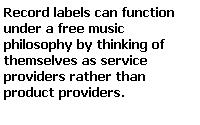 label (CD’s and records) in South America would be difficult since most of the market and distribution channels are located in North America and Europe. Do you feel like free audio downloads make it easier for you to reach a global audience than if you were to press CD’s or records?
label (CD’s and records) in South America would be difficult since most of the market and distribution channels are located in North America and Europe. Do you feel like free audio downloads make it easier for you to reach a global audience than if you were to press CD’s or records?
Microbio: For a Venezuelan electronic musician is almost impossible to sign a deal with a local label. In the case of independent labels the cost for editions are really high, and we don’t have a local independent distribution network. The Internet is the solution of this problem; we can release our work without any restriction (besides hard disk space and bandwidth) and show it to the rest of the world, in a different system of code between the musician-label-listener relationship. Since we started releasing on-line we have got listeners from Macedonia, Ukraine, South Africa, Russia, Moldavia, Australia, only a 0.05% of listeners are from South America. The internet has become in a reliable way of distribution, giving the artist all the freedom to create a non commercial ruled music. (Emiliano @ Microbio Records)
::..:::…..:..::….:::::..:::..:::::::……:::…::.:::….::::..:..:::…::…….:::::
We will probably see various models of Internet music distribution experimented with by larger labels (pay per download, subscription services, etc) until they find one that proves to be useable by consumers and lucrative for them. However, regarding independent and underground music, free music is proving to be a highly effective model. If you want more information regarding free high quality electronic music available on the web, visit Phlow Magazine’s MP3 label page and the netaudio review page at De:Bug online. Additionally, the following email lists are useful:
::..:::…..:..::….:::::..:::..:::::::……:::…::.:::….::::..:..:::…::…….:::::
Read more:







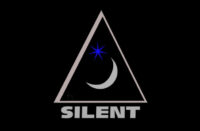



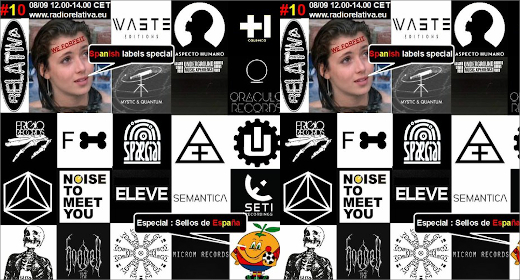
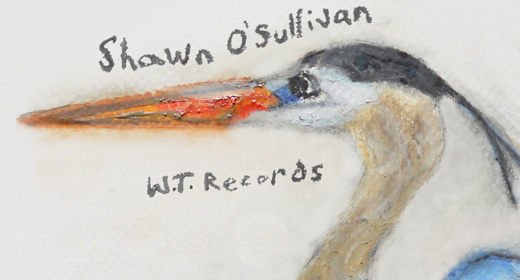


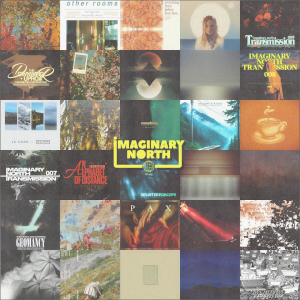






![Romanowitch :: A critical season substitute (glitch.cool) — [concise]](https://igloomag.com/wp/wp-content/uploads/2025/03/romanowitch-a-critical-season-substitute_tape_feat-75x75.jpg)

